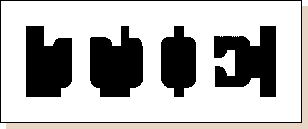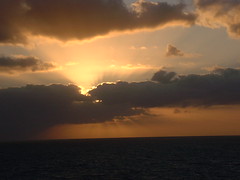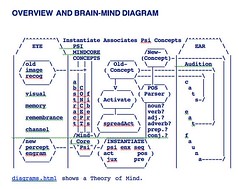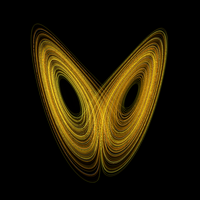I say unto you; one must still have chaos in oneself to be able to give birth to a dancing star.
- Nietzsche, Thus Spoke Zarathustra
25 August 2006
12 June 2006
the end...

This is the end, beautiful friend
This is the end, my only friend
The end of our elaborate plans
The end of ev'rything that stands
The end
No safety or surprise
The end
I'll never look into your eyes again
Can you picture what will be
So limitless and free
Desperately in need of
some strangers hand
In a desperate land
Lost in a Roman wilderness of pain
And all the children are insane
All the children are insane
Waiting for the summer rain
There's danger on the edge of town
Ride the king's highway
Weird scenes inside the goldmine
Ride the highway West baby
Ride the snake
Ride the snake
To the lake
To the lake
The ancient lake baby
The snake is long
Seven miles
Ride the snake
He's old
And his skin is cold
The west is the best
The west is the best
Get here and we'll do the rest
The blue bus is calling us
The blue bus is calling us
Driver, where you taking us?
The killer awoke before dawn
He put his boots on
He took a face from the ancient gallery
And he walked on down the hall
He went into the room where his sister lived
And then he paid a visit to his brother
And then he walked on down the hall
And he came to a door
And he looked inside
Father?
Yes son
I want to kill you
Mother, I want to.............
Come on, baby, take a chance with us
Come on, baby, take a chance with us
Come on, baby, take a chance with us
And meet me at the back of the blue bus
This is the end, beautiful friend
This is the end, my only friend
The end
It hurts to set you free
But you'll never follow me
The end of laughter and soft lies
The end of nights we tried to die
This is the end
- - Jim Morrison, The End, Doors
I wouldn't mind dying in a plane crash. It'd be a good way to go. I don't want to die in my sleep, or of old age, or OD... I want to feel what it's like. I want to taste it, hear it, smell it. Death is only going to happen to you once; I don't want to miss it.
- Jim Morrison
...enough said.
10 June 2006
...and what do my words create?
The glory of creation is in its infinite diversity.
And in the way our differences combine to create meaning and beauty.
-- Dr. Miranda Jones and Spock, Is There in Truth No Beauty?
stardate 5630.8
...do i need anyone to give me the power to create meaning?
...did i receive this power from someone else?
...or did i give it to myself?
08 June 2006
twenty-five days of nothing...
VLADIMIR:
...I'm beginning to come round to that opinion. All my life I've tried to put it from me, saying Vladimir, be reasonable, you haven't yet tried everything. And I resumed the struggle. (He broods, musing on the struggle. Turning to Estragon.) So there you are again.
ESTRAGON:
Am I?
VLADIMIR:
I'm glad to see you back. I thought you were gone forever.
ESTRAGON:
Me too.
VLADIMIR:
Together again at last! We'll have to celebrate this. But how? (He reflects.) Get up till I embrace you.
ESTRAGON:
(irritably). Not now, not now.
Waiting for Godot, Samuel Beckett
14 May 2006
the time has come...
to realize that not only lemmings follow in step without question...
Lewis Carroll, from Alice Through The Looking Glass, Ch. 4
some follow carpenters...
"The Walrus and the Carpenter"
... The Walrus and the Carpenter
Were walking close at hand;
They wept like anything to see
Such quantities of sand:
"If this were only cleared away,"
They said, "it WOULD be grand!"
"If seven maids with seven mops
Swept it for half a year,
Do you suppose," the Walrus said,
"That they could get it clear?"
"I doubt it," said the Carpenter,
And shed a bitter tear.
"O Oysters, come and walk with us!"
The Walrus did beseech.
"A pleasant walk, a pleasant talk,
Along the briny beach:
We cannot do with more than four,
To give a hand to each."
The eldest Oyster looked at him.
But never a word he said:
The eldest Oyster winked his eye,
And shook his heavy head --
Meaning to say he did not choose
To leave the oyster-bed.
But four young oysters hurried up,
All eager for the treat:
Their coats were brushed, their faces washed,
Their shoes were clean and neat --
And this was odd, because, you know,
They hadn't any feet.
Four other Oysters followed them,
And yet another four;
And thick and fast they came at last,
And more, and more, and more --
All hopping through the frothy waves,
And scrambling to the shore.
The Walrus and the Carpenter
Walked on a mile or so,
And then they rested on a rock
Conveniently low:
And all the little Oysters stood
And waited in a row.
"The time has come," the Walrus said,
"To talk of many things:
Of shoes -- and ships -- and sealing-wax --
Of cabbages -- and kings --
And why the sea is boiling hot --
And whether pigs have wings."
... "It seems a shame," the Walrus said,
"To play them such a trick,
After we've brought them out so far,
And made them trot so quick!"
The Carpenter said nothing but
"The butter's spread too thick!"
"I weep for you," the Walrus said.
"I deeply sympathize."
With sobs and tears he sorted out
Those of the largest size.
Holding his pocket handkerchief
Before his streaming eyes.
"O Oysters," said the Carpenter.
"You've had a pleasant run!
Shall we be trotting home again?"
But answer came there none --
And that was scarcely odd, because
They'd eaten every one.'
Lewis Carroll, from Alice Through The Looking Glass, Ch. 4
some follow carpenters...
23 April 2006
the birth of god...
is only in the utterance of one word...
god
nothing exists until there is a word for it.
nothing...
god
nothing exists until there is a word for it.
nothing...
26 March 2006
the death of god...
Martha: Did you, did you have to?
George: Yes.
Martha: ...You had to?
George: Yes.
Martha: I don't know.
George: It was time.
Martha: Was it?
George: Yes.
Martha: I'm cold.
George: It's late.
Martha: Yes.
George: It will be better.
Martha: I don't know.
George: It will be, maybe.
Martha: I'm not sure.
George: No.
Martha: Just us?
George: Yes.
Martha: You don't suppose, maybe...
George: No.
Martha: Yes. No.
George: All right?
Martha: Yes. No.
George (singing softly to her):
Who's afraid of Virginia Woolf
Virginia Woolf
Virginia Woolf
Martha: I am George.
George: Who's afraid of Virginia Woolf?
Martha: I am George, I am.
Albee, Edward: Who's Afraid of Virginia Woolf?, 1966
there has long been a cry following publication of Nietzshe's works that he declared that "God is dead!"
i don't believe that that is actually what he meant...
i believe he meant that man killed god...
god did not die of his/her own volition...
if he/she ever existed...
George: Yes.
Martha: ...You had to?
George: Yes.
Martha: I don't know.
George: It was time.
Martha: Was it?
George: Yes.
Martha: I'm cold.
George: It's late.
Martha: Yes.
George: It will be better.
Martha: I don't know.
George: It will be, maybe.
Martha: I'm not sure.
George: No.
Martha: Just us?
George: Yes.
Martha: You don't suppose, maybe...
George: No.
Martha: Yes. No.
George: All right?
Martha: Yes. No.
George (singing softly to her):
Who's afraid of Virginia Woolf
Virginia Woolf
Virginia Woolf
Martha: I am George.
George: Who's afraid of Virginia Woolf?
Martha: I am George, I am.
Albee, Edward: Who's Afraid of Virginia Woolf?, 1966
there has long been a cry following publication of Nietzshe's works that he declared that "God is dead!"
i don't believe that that is actually what he meant...
i believe he meant that man killed god...
god did not die of his/her own volition...
if he/she ever existed...
18 March 2006
...do you see what i see?

the principle of surroundedness, according to which areas which can be seen as surrounded by others tend to be perceived as figures.*
i don't see anything...
i see something...
i see...
nothing...
*Chandler, Daniel: Codes, Semiotics for Beginners
15 March 2006
rien...
Togod [to Faustus]: "Repeat after me. There is ... Nothing! Nothing ... nothing ... No! ... Nothing ... nothing ... That's it ... That's right ... That's the way it is."

Pour qui suis-je ?
J’ai oublié qui je suis!
Faustus, the Last Night, Pascal Dusapin, composer
Enregistré par France Musiques Commande et production de l'Opéra national de Lyon et du Staatsoper de Berlin, 2005

Pour qui suis-je ?
J’ai oublié qui je suis!
Faustus, the Last Night, Pascal Dusapin, composer
Enregistré par France Musiques Commande et production de l'Opéra national de Lyon et du Staatsoper de Berlin, 2005
08 March 2006
je ne pense pas...
Did you hear about Rene Descartes' visit to England? He went into a pub and the barmaid said "Can I get you something, luv?''
He said, "I think not.'' And disappeared.
anonymous
...et le monde continu ou pas!
He said, "I think not.'' And disappeared.
anonymous
...et le monde continu ou pas!
28 February 2006
a candle briefly out...
Macbeth: To-morrow, and to-morrow, and to-morrow,
Creeps in this petty pace from day to day,
To the last syllable of recorded time;
And all our yesterdays have lighted fools
The way to dusty death. Out, out, brief candle!
Life's but a walking shadow; a poor player,
That struts and frets his hour upon the stage,
And then is heard no more: it is a tale
Told by an idiot, full of sound and fury,
Signifying nothing.
Shakespeare, William; Macbeth, Act 5, scene 5
...and then nothing?
Creeps in this petty pace from day to day,
To the last syllable of recorded time;
And all our yesterdays have lighted fools
The way to dusty death. Out, out, brief candle!
Life's but a walking shadow; a poor player,
That struts and frets his hour upon the stage,
And then is heard no more: it is a tale
Told by an idiot, full of sound and fury,
Signifying nothing.
Shakespeare, William; Macbeth, Act 5, scene 5
...and then nothing?
25 February 2006
if nothing, then despair...
I am a sick man... I am a spiteful man. I am an unattractive man. I believe my liver is diseased....
I was lying when I said just now that I was a spiteful official. I was lying from spite. I was simply amusing myself with the petitioners and with the officer, and in reality I never could become spiteful.
It was not only that I could not become spiteful, I did not know how to become anything: neither spiteful nor kind, neither a rascal nor an honest man, niether a hero nor an insect. Now, I am living out my life in my corner, taunting myself with the spiteful and useless consolation that an intelligent man cannot become anything seriously, and it is only the fool who becomes anything.... I am forty years old now.... To live longer than forty years is bad manners, is vulgar, immoral. Who does live beyond forty? Answer that, sincerely and honestly. I will tell you who do: fools and worthless fellows.
Dostoevsky, Fyodor; Notes from Underground, I; originally published 1918.
...worthless fellows? ...fools? ...spite? ...honesty? ...amusing?
...words of despair?
I was lying when I said just now that I was a spiteful official. I was lying from spite. I was simply amusing myself with the petitioners and with the officer, and in reality I never could become spiteful.
It was not only that I could not become spiteful, I did not know how to become anything: neither spiteful nor kind, neither a rascal nor an honest man, niether a hero nor an insect. Now, I am living out my life in my corner, taunting myself with the spiteful and useless consolation that an intelligent man cannot become anything seriously, and it is only the fool who becomes anything.... I am forty years old now.... To live longer than forty years is bad manners, is vulgar, immoral. Who does live beyond forty? Answer that, sincerely and honestly. I will tell you who do: fools and worthless fellows.
Dostoevsky, Fyodor; Notes from Underground, I; originally published 1918.
...worthless fellows? ...fools? ...spite? ...honesty? ...amusing?
...words of despair?
05 February 2006
and then consistency...
A. - Being - possible limit.
Possible - that which does not imply contradiction.
Existing - compossible with the most perfect.
Compossible - that which does not imply contradiction with another.
More perfect is that which has more of reality or of positive entity.
B. – Being or possible. Existing is that possible series which envelops more of reality, and whatever advances with that.
C. – Existence cannot be defined, no more than being or pure positive, so of course how can any clearer idea be presented to us; but it is known that every possible would exist if it could, but because not every possible can exist, those exist which are more perfect. And so that which is most perfect, it certainly is well known to exist. But there is some most perfect being, i.e. the greatest perfection that is possible, because it is nothing other than pure positive.
Leibniz, Gottfried Wilhelm; DEFINITIONS (1683-94?); from Grua, Gaston (ed); Textes inédits tome 1 pp 324 - 325; Original translation © Maureen Sawbridge 2002; Revised translation © Lloyd Strickland 2003; Leibniz Translation.com
...how can one thing be more perfect than another?
Possible - that which does not imply contradiction.
Existing - compossible with the most perfect.
Compossible - that which does not imply contradiction with another.
More perfect is that which has more of reality or of positive entity.
B. – Being or possible. Existing is that possible series which envelops more of reality, and whatever advances with that.
C. – Existence cannot be defined, no more than being or pure positive, so of course how can any clearer idea be presented to us; but it is known that every possible would exist if it could, but because not every possible can exist, those exist which are more perfect. And so that which is most perfect, it certainly is well known to exist. But there is some most perfect being, i.e. the greatest perfection that is possible, because it is nothing other than pure positive.
Leibniz, Gottfried Wilhelm; DEFINITIONS (1683-94?); from Grua, Gaston (ed); Textes inédits tome 1 pp 324 - 325; Original translation © Maureen Sawbridge 2002; Revised translation © Lloyd Strickland 2003; Leibniz Translation.com
...how can one thing be more perfect than another?
01 February 2006
another Koan...
Nothing Exists
Yamaoka Tesshu, as a young student of Zen, visited one master after another. He called upon Dokuon of Shokoku.
Desiring to show his attainment, he said: "The mind, Buddha, and sentient beings, after all, do not exist. The true nature of phenomena is emptiness. There is no relaization, no delusion, no sage, no mediocrity. There is no giving and nothing to be received."
Dokuon, who was smoking quietly, said nothing. Suddenly he whacked Yamaoka with his bamboo pipe. This made the youth quite angry.
"If nothing exists," inquired Dokuon, "where did this anger come from?"
Zen Koans
...is misery?
Yamaoka Tesshu, as a young student of Zen, visited one master after another. He called upon Dokuon of Shokoku.
Desiring to show his attainment, he said: "The mind, Buddha, and sentient beings, after all, do not exist. The true nature of phenomena is emptiness. There is no relaization, no delusion, no sage, no mediocrity. There is no giving and nothing to be received."
Dokuon, who was smoking quietly, said nothing. Suddenly he whacked Yamaoka with his bamboo pipe. This made the youth quite angry.
"If nothing exists," inquired Dokuon, "where did this anger come from?"
Zen Koans
...is misery?
30 January 2006
if nothing exists...
The Death of God as the Self-Overcoming of Christianity. What, in all strictness has really conquered the Christian God? The answer may be found in my Gay Science (section 357): "Christian morality itself, the concept of truthfulness taken more and more strictly, the confessional subtlety of the Christian conscience translated and sublimated into the scientific conscience, into intellectual cleanliness at any price. To view nature as if it were a proof of the good and providence of a God; to interpret history to the glory of a divine reason, as the perpetual witness to a moral world order and moral intentions; to interpret one’s own experiences, as pious men long interpreted them, as if everything were preordained, everything a sign, everything sent for the salvation of the soul — that now belongs to the past, that has the conscience against it, that seems to every more sensitive conscience indecent, dishonest, mendacious, feminism, weakness, cowardice: it is this rigor if anything that makes us good Europeans and the heirs of Europe’s longest and bravest self-overcoming.
All great things bring about their own destruction through an act of self-overcoming: thus the law of life will have it, the law of the necessity of "self-overcoming" in the nature of life — the law-giver himself eventually receives the call. . . In this way Christianity as a dogma was destroyed by its own morality; in the same way Christianity as morality must now perish too: we stand on the threshold of this event. After Christian truthfulness has drawn one inference after another, it must end by drawing its most striking inference, its inference against itself.
MSU.org SELECTED NIETZSCHE TEXTS
...then why have this conversation?
All great things bring about their own destruction through an act of self-overcoming: thus the law of life will have it, the law of the necessity of "self-overcoming" in the nature of life — the law-giver himself eventually receives the call. . . In this way Christianity as a dogma was destroyed by its own morality; in the same way Christianity as morality must now perish too: we stand on the threshold of this event. After Christian truthfulness has drawn one inference after another, it must end by drawing its most striking inference, its inference against itself.
MSU.org SELECTED NIETZSCHE TEXTS
...then why have this conversation?
29 January 2006
is that all...
George: You take the trouble to construct a civilization...to build a society based on the principles of...you make government and art, and realize that they are, must be, both the same...you bring things to the saddest of all points...to the point where there is something to lose...then all at once, through all the music, through all the sensible sounds of men building, attempting, comes the Dies Irae. And what is it? What does the trumpet sound? Up yours.
Albee, Edward; "Who's afraid of Virginia Woolf"; 1966
...there is, my friend?
Albee, Edward; "Who's afraid of Virginia Woolf"; 1966
...there is, my friend?
27 January 2006
nothing exists...
What has been exists no more; and exists just as little as that which has never been. But everything that exists has been in the next moment. Hence something belonging to the present, however unimportant it may be, is superior to something important belonging to the past; this is because the former is a reality and related to the latter as something is to nothing.
A man to his astonishment all at once becomes conscious of existing after having been in a state of non-existence for many thousands of years, when, presently again, he returns to a state of non-existence for an equally long time. This cannot possibly be true, says the heart; and even the crude mind, after giving the matter its consideration, must have some sort of presentiment of the ideality of time. This ideality of time, together with that of space, is the key to every true system of metaphysics, because it finds room for quite another order of things than is to be found in nature.
Schopenhauer, Arthur, "The Emptiness of Existence," Essays of Schopenhauer, eBooks@Adelaide
...then exists and after that doesn't exist again?
A man to his astonishment all at once becomes conscious of existing after having been in a state of non-existence for many thousands of years, when, presently again, he returns to a state of non-existence for an equally long time. This cannot possibly be true, says the heart; and even the crude mind, after giving the matter its consideration, must have some sort of presentiment of the ideality of time. This ideality of time, together with that of space, is the key to every true system of metaphysics, because it finds room for quite another order of things than is to be found in nature.
Schopenhauer, Arthur, "The Emptiness of Existence," Essays of Schopenhauer, eBooks@Adelaide
...then exists and after that doesn't exist again?
26 January 2006
breaking wind...
The Question Arises ...
What makes it serious
is that we know
that after the order
of this world
there is another.
What is it like?
We do not know.
The number and order of possible suppositions in
this realm
is precisely
infinity!
And what is infinity?
That is precisely what we do not know!
It is a word
that we use
to indicate
the opening
of our consciousness
toward possibility
beyond measure,
tireless and beyond measure.
And precisely what is consciousness?
That is precisely what we do not know.
It is nothingness.
A nothingness
that we use
to indicate
when we do not know something
from what side
we do not know it
and so
we say
consciousness,
from the side of consciousness,
but there are a hundred thousand other sides.
Well?
It seems that consciousness
in us is
linked
to sexual desire
and to hunger;
but it could
just as well
not be linked
to them.
One says,
one can say,
there are those who say
that consciousness
is an appetite,
the appetite for living;
and immediately
alongside the appetite for living,
it is the appetite for food
that comes immediately to mind;
as if there were not people who eat
without any sort of appetite;
and who are hungry.
For this too
exists
to be hungry
without appetite;
well?
Well
the space of possibility
was given to me one day
like a loud fart
that I will make;
but neither of space,
nor possibility,
did I know precisely what it was,
and I did not feel the need to think about it,
they were words
invented to define things
that existed
or did not exist
in the face of
the pressing urgency
of a need:
the need to abolish the idea,
the idea and its myth,
and to enthrone in its place
the thundering manifestation
of this explosive necessity:
to dilate the body of my internal night,
the internal nothingness
of my self
which is night,
nothingness,
thoughtlessness,
but which is explosive affirmation
that there is
something
to make room for:
my body....
Artaud, Antonin; "To Have Done with the Judgement of God," a radio play, broadcast on French radio February 2, 1948
...is that all there is?
What makes it serious
is that we know
that after the order
of this world
there is another.
What is it like?
We do not know.
The number and order of possible suppositions in
this realm
is precisely
infinity!
And what is infinity?
That is precisely what we do not know!
It is a word
that we use
to indicate
the opening
of our consciousness
toward possibility
beyond measure,
tireless and beyond measure.
And precisely what is consciousness?
That is precisely what we do not know.
It is nothingness.
A nothingness
that we use
to indicate
when we do not know something
from what side
we do not know it
and so
we say
consciousness,
from the side of consciousness,
but there are a hundred thousand other sides.
Well?
It seems that consciousness
in us is
linked
to sexual desire
and to hunger;
but it could
just as well
not be linked
to them.
One says,
one can say,
there are those who say
that consciousness
is an appetite,
the appetite for living;
and immediately
alongside the appetite for living,
it is the appetite for food
that comes immediately to mind;
as if there were not people who eat
without any sort of appetite;
and who are hungry.
For this too
exists
to be hungry
without appetite;
well?
Well
the space of possibility
was given to me one day
like a loud fart
that I will make;
but neither of space,
nor possibility,
did I know precisely what it was,
and I did not feel the need to think about it,
they were words
invented to define things
that existed
or did not exist
in the face of
the pressing urgency
of a need:
the need to abolish the idea,
the idea and its myth,
and to enthrone in its place
the thundering manifestation
of this explosive necessity:
to dilate the body of my internal night,
the internal nothingness
of my self
which is night,
nothingness,
thoughtlessness,
but which is explosive affirmation
that there is
something
to make room for:
my body....
Artaud, Antonin; "To Have Done with the Judgement of God," a radio play, broadcast on French radio February 2, 1948
...is that all there is?
24 January 2006
and the mirror kept reflecting...
In the philosophical sense, the major implication of epiphenomenalism is that what we do or feel is never caused by what we experience or have experienced. This implication goes much further than the negation of free will. As subjective beings, we are completely impotent confronted by the processes of the material world. We cannot exert any influence upon them, but we are completely determined by them. Our relations with reality, our relation with ourselves, with other persons, with objects, etc., are completely caused by physiological processes in the brain.
Such relations never initiate anything. Thus, epiphenomenalism anthropologically implies an "imprisoned" consciousness that can undertake absolutely nothing and never has any power over itself. Naturally, this metaphysics has great consequences for the axiology and ethics. In fact, axiologically epiphenomenalism implies that all our values are biogenical; there are no values that would not be epiphenomena of neurological processes.
Rivas, Titus & van Dongen, Hein Exit Epiphenomenalism: The Demolition of a Refuge published in the Journal of Non-Locality and Remote Mental Interactions, vol. 57, 2001
Epiphenomenalism is the view in philosophy of mind according to which physical events have mental effects, but mental events have no effects of any kind. This is a radical idea because it denies the concept that the mind has any control over the body, or even any ability to cause an action in the world. Human experience is present, but inert.
Wikipedia: Epiphenomenalism
... even what it could not see?
Such relations never initiate anything. Thus, epiphenomenalism anthropologically implies an "imprisoned" consciousness that can undertake absolutely nothing and never has any power over itself. Naturally, this metaphysics has great consequences for the axiology and ethics. In fact, axiologically epiphenomenalism implies that all our values are biogenical; there are no values that would not be epiphenomena of neurological processes.
Rivas, Titus & van Dongen, Hein Exit Epiphenomenalism: The Demolition of a Refuge published in the Journal of Non-Locality and Remote Mental Interactions, vol. 57, 2001
Epiphenomenalism is the view in philosophy of mind according to which physical events have mental effects, but mental events have no effects of any kind. This is a radical idea because it denies the concept that the mind has any control over the body, or even any ability to cause an action in the world. Human experience is present, but inert.
Wikipedia: Epiphenomenalism
... even what it could not see?
20 January 2006
on holiday...

...sunset off the coast of Cuba
Philosophers mean to be on holiday as they turn to Nietzsche -- that may be why so many non-specialists feel perfectly competent to talk or even write books about Nietzsche. On holiday, one seeks the liberating prospect of the open sea, the roar of the waves, or a sense of mountain air and clear light.
Babich, Babette E., HEIDEGGER'S RELATION TO NIETZSCHE'S THINKING: ON CONNIVANCE, NIHILISM, AND VALUE
clarity, competence, calmness, connivance, chaos...?
12 January 2006
mirror, mirror on the wall...
A mirror neuron is a neuron which fires both when performing an action and when observing the same action performed by another (possibly conspecific) creature. Thus, the neuron "mirrors" the behavior of another animal, as though the observer were performing the action. These neurons have been observed in primates, some birds, and humans in Broca's and the inferior parietal cortex of the brain. Some scientists consider mirror neurons one of the most important findings of neuroscience in the last decade.
Cells That Read Minds New York Times, January 11, 2006
.... who has the most free will of all?
Cells That Read Minds New York Times, January 11, 2006
.... who has the most free will of all?
11 January 2006
reductive consciousness...
A higher order theory of consciousness is, in a certain sense, a reductive theory of consciousness. Suppose some day we are granted an understanding of sentience and sensory states with their qualitative character. These provide one variety of transitive state consciousness. Suppose we also come to understand mental representation, or at least how thoughts represent. We would then understand two kinds of transitive state consciousness, or two ways of being conscious of something: by sensing it, or by thinking about it. What other resources do we need to give a full account of conscious mental states? It may seem that the latter question is a further and much harder question, requiring new and mysterious resources for its solution. But the bold answer of the higher order theorist is: nothing more is needed. Solving those problems would solve the problem of consciousness. With an understanding of sensory qualities and of how thought represents, you can give a full account not only of mental states but of the difference between conscious mental states and unconscious ones.
Clark , Austen; Phenomenal Consciousness so-called; Presented at the Italian Institute for Philosophical Studies, International School of Biophysics study program "From Neuronal Coding to Consciousness", Ischia (Naples), 12-17 October 1998
...simplified or over-simplified?
Clark , Austen; Phenomenal Consciousness so-called; Presented at the Italian Institute for Philosophical Studies, International School of Biophysics study program "From Neuronal Coding to Consciousness", Ischia (Naples), 12-17 October 1998
...simplified or over-simplified?
07 January 2006
in·stan·ti·ate ii...
[Regarding] those matters which I think I see utterly clearly with my mind's eye … when I turn to the things themselves which I think I perceive very clearly, I am so convinced by them that I spontaneously declare: let whoever can do so deceive me, he will never bring it about that I am nothing, so long as I continue to think I am something; or make it true at some future time that I have never existed, since it is now true that I exist; or bring it about that two and three added together are more or less than five, or anything of this kind in which I see a manifest contradiction.
Descartes, Rene; Meditation 3, AT, 7:36
... 2 + 3 = or ≠ 5?
Descartes, Rene; Meditation 3, AT, 7:36
... 2 + 3 = or ≠ 5?
06 January 2006
cogito, ergo sum...

in·stan·ti·ate (ĭn-stăn'shē-āt')
tr.v., -at·ed, -at·ing, -ates.
To represent (an abstract concept) by a concrete or tangible example:
eg. “Two apples … both instantiate the single universal redness”
answers.com
...JUST a theory?
...what would Descartes think?
05 January 2006
thinking...
VLADIMIR:
This is awful!
ESTRAGON:
Sing something.
VLADIMIR:
No no! (He reflects.) We could start all over again perhaps.
ESTRAGON:
That should be easy.
VLADIMIR:
It's the start that's difficult.
ESTRAGON:
You can start from anything.
VLADIMIR:
Yes, but you have to decide.
ESTRAGON:
True.
(Silence.)
VLADIMIR:
Help me!
ESTRAGON:
I'm trying.
(Silence.)
VLADIMIR:
When you seek you hear.
ESTRAGON:
You do.
VLADIMIR:
That prevents you from finding.
ESTRAGON:
It does.
VLADIMIR:
That prevents you from thinking.
ESTRAGON:
You think all the same.
VLADIMIR:
No no, it's impossible.
ESTRAGON:
That's the idea, let's contradict each another.
VLADIMIR:
Impossible.
ESTRAGON:
You think so?
VLADIMIR:
We're in no danger of ever thinking any more.
ESTRAGON:
Then what are we complaining about?
VLADIMIR:
Thinking is not the worst.
ESTRAGON:
Perhaps not. But at least there's that.
VLADIMIR:
That what?
ESTRAGON:
That's the idea, let's ask each other questions.
VLADIMIR:
What do you mean, at least there's that?
ESTRAGON:
That much less misery.
VLADIMIR:
True.
ESTRAGON:
Well? If we gave thanks for our mercies?
VLADIMIR:
What is terrible is to have thought.
Beckett, Samuel; Waiting for Godot, Act II
...is misery?
This is awful!
ESTRAGON:
Sing something.
VLADIMIR:
No no! (He reflects.) We could start all over again perhaps.
ESTRAGON:
That should be easy.
VLADIMIR:
It's the start that's difficult.
ESTRAGON:
You can start from anything.
VLADIMIR:
Yes, but you have to decide.
ESTRAGON:
True.
(Silence.)
VLADIMIR:
Help me!
ESTRAGON:
I'm trying.
(Silence.)
VLADIMIR:
When you seek you hear.
ESTRAGON:
You do.
VLADIMIR:
That prevents you from finding.
ESTRAGON:
It does.
VLADIMIR:
That prevents you from thinking.
ESTRAGON:
You think all the same.
VLADIMIR:
No no, it's impossible.
ESTRAGON:
That's the idea, let's contradict each another.
VLADIMIR:
Impossible.
ESTRAGON:
You think so?
VLADIMIR:
We're in no danger of ever thinking any more.
ESTRAGON:
Then what are we complaining about?
VLADIMIR:
Thinking is not the worst.
ESTRAGON:
Perhaps not. But at least there's that.
VLADIMIR:
That what?
ESTRAGON:
That's the idea, let's ask each other questions.
VLADIMIR:
What do you mean, at least there's that?
ESTRAGON:
That much less misery.
VLADIMIR:
True.
ESTRAGON:
Well? If we gave thanks for our mercies?
VLADIMIR:
What is terrible is to have thought.
Beckett, Samuel; Waiting for Godot, Act II
...is misery?
04 January 2006
allusionary...
There is an order where the subject finds himself in the presence of something entirely beyond his grasp. I would add that if the word “transcendent” has any meaning it is here — it designates the absolute, unbridgeable chasm yawning between the subject and being, insofar as being evades every attempt to pin it down.
Marcel, Gabriel, 1973, p. 193, Tragic Wisdom and Beyond, Translated by Stephen Jolin and Peter McCormick. Publication of the Northwestern University Studies in Phenomenology and Existential Philosophy, ed. John Wild. Evanston, IL: Northwestern University Press
...without mentioning it explicitly?
Marcel, Gabriel, 1973, p. 193, Tragic Wisdom and Beyond, Translated by Stephen Jolin and Peter McCormick. Publication of the Northwestern University Studies in Phenomenology and Existential Philosophy, ed. John Wild. Evanston, IL: Northwestern University Press
...without mentioning it explicitly?
Subscribe to:
Comments (Atom)
